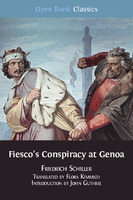Fiesco's Conspiracy at Genoa
Author(s)
Schiller, Friedrich
Contributor(s)
Guthrie, John (editor)
Collection
ScholarLedLanguage
EnglishAbstract
Within two years of the success of his first play Die Räuber on the German stage in 1781, Schiller wrote a drama based on a rebellion in sixteenth century Italy, its title: The Conspiracy of Fiesco at Genoa. A Republican Tragedy. At the head of the conspiracy stood Gian Luigi deâ Fieschi (1524-1547), Schillerâ s Count Fiesco, a clever, courageous and charismatic figure, an epicurean and unhesitant egoist, politically ambitious, but unsure of his aims and principles. He is one of Schillerâ s mysterious, protean characters who secures both our admiration and disgust. With Fiesco as tragic hero Schiller examines the complex entanglement of morality and politics in his own times that was to preoccupy him throughout his career. The play was a moderate success when performed in Mannheim in 1784; it was more popular in Berlin, where during Schillerâ s lifetime, it was performed many times in a version by Carl Plümicke, which however radically altered the playâ s meaning. There have been some noteworthy productions on the German stage and television, even if it has remained somewhat in the shadow of Schillerâ other works. In the English-speaking world it is all but unknown and very seldom performed. This translation aims to remedy that oversight.
Keywords
fiesco; conspiracy; friedrich schiller; translation; genoa; play; drama; Lavagna; Republic of GenoaDOI
10.11647/OBP.0058ISBN
9781783740420OCN
913570904Publisher
Open Book PublishersPublisher website
https://www.openbookpublishers.com/Publication date and place
2015Series
Open Book Classics,Classification
Theatre studies
Literary studies: plays and playwrights


 Download
Download Web Shop
Web Shop